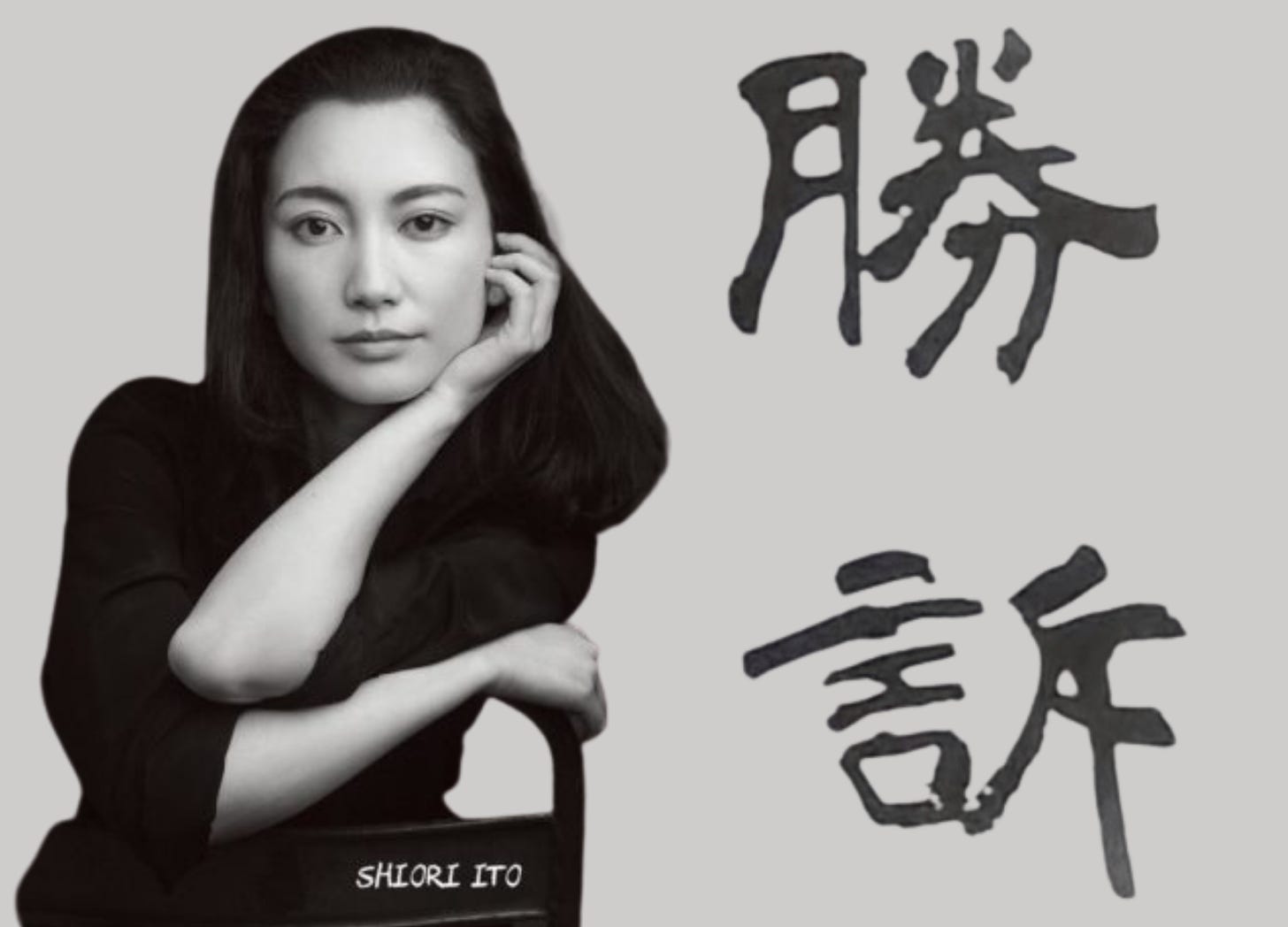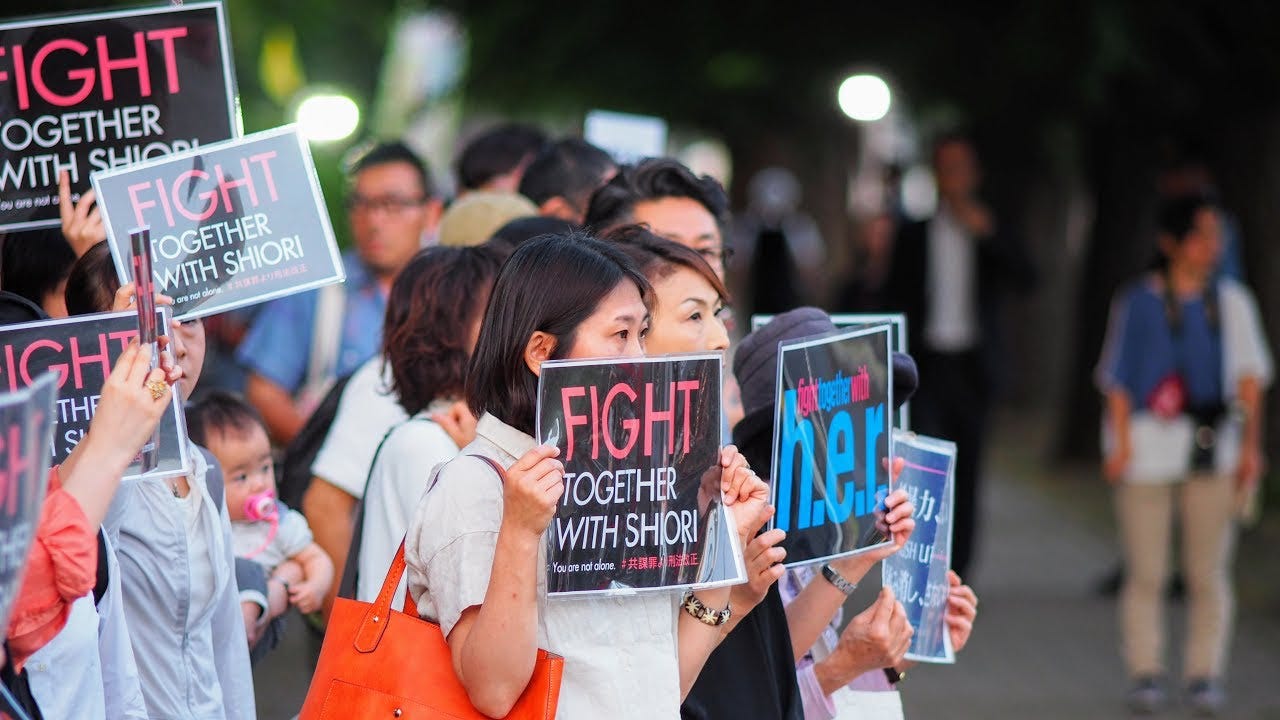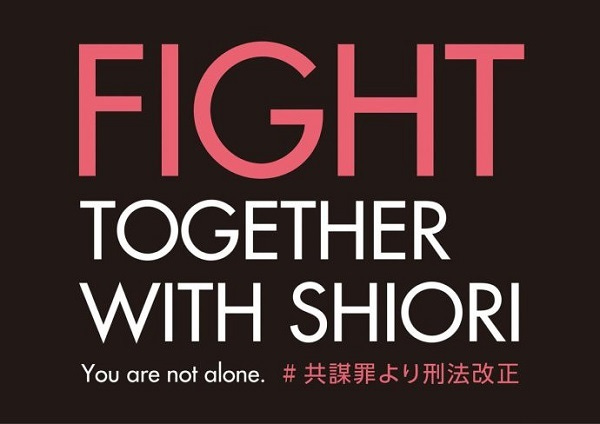Shiori Ito’s widely-publicized rape case, involving an influential journalist friendly with former Prime Minister Shinzo Abe, ignited Japan’s nascent “Me Too” movement.
Feminist activists are increasingly putting pressure on authorities to enact harsher penalties for male sexual violence, but they face a fiercely misogynist system rooted in patriarchal tradition.
In 2015, Shiori Ito was an aspiring journalist interning with the Japanese branch of Reuters. Seeking to further her career, she agreed to meet with Noriyuki Yamaguchi, bureau chief with Tokyo Broadcasting System (TBS), after he hinted at a job offer.
They went for an upscale sushi dinner together in April 2015. After a few drinks, Ms. Ito blacked out. She awoke in a Tokyo hotel to find Yamaguchi lying on top of her.
According to her memoir, Black Box, “The intense pain was what made me regain consciousness. I found myself on a bed, in a room with gauzy curtains drawn, and there was a heavy weight pressing down upon me.”
“Neither the recognition that I had regained consciousness, nor my repeated pleas that I was in pain, made him stop what he was doing,” wrote Ms. Ito.
She told Mr. Yamaguchi she needed to go to the restroom, where she realized for the first time that she was in his hotel room, without any recollection of how she had arrived there. When she returned to the bedroom, Ms. Ito says that Mr. Yamaguchi tried to rape her a second time.
“With grim determination, I opened the door, but Mr. Yamaguchi was standing right there, and he took hold of my shoulders, dragging me back to the bed and throwing me down on it,” Ms. Ito wrote in her book, Black Box.
“He held my body and my head against the bed with such force that I was unable to resist, and he started raping me again. When I shut my legs together and twisted my body around, Mr. Yamaguchi’s face drew close like he was about to kiss me. Struggling desperately, I turned away, and my face was then pressed against the bed. Pinned down and held this way, I couldn’t breathe and, fearing I would suffocate, at that moment I thought to myself, I’m going to die.”
Ms. Ito also suspected the assault was being recorded due to the placement of Mr. Yamaguchi’s laptop. “Instinctively, something about the angle of the screen, pointing in this direction, gave the impression that it was recording something.”
She then took to confronting and cursing him in English, as the Japanese language does not contain swear words and she had previously been using an honorific form when addressing him.
“After I finally broke myself free from the bed, my mind still blank with panic, I went around the room, picking up my clothing that was strewn about and holding it close,” Ms. Ito recalled.
“I couldn’t find my underwear. I asked him to give it back, but Mr. Yamaguchi didn’t move. I looked everywhere for my bra—it was on top of Mr. Yamaguchi’s open suitcase. But my panties were nowhere to be found. ‘Let me keep them as a souvenir,’ Mr. Yamaguchi said. When I heard those words, my whole body went limp and I collapsed into a heap on the floor.”
Ms. Ito was eventually able to flee, and for days afterwards she struggled to get out of bed. Five days later, she went to a police station, where another kind of assault began. Ultimately, Shiori Ito would spend more than three years fighting to have the violence done to her recognized as rape.
When Shiori Ito first reported the assault to police, she was told by an investigating officer, “This kind of thing happens all the time and there’s no easy way to investigate cases like these.” Tokyo police tried to discourage her from pursuing charges, and asked about her sex life and what she was wearing.
Despite the obstacles, Ms. Ito persisted. Witnesses attested to her unconscious state. Hotel footage depicted Mr. Yamaguchi dragging her across the lobby. A hotel bellman told of seeing him attempt to remove her from the taxi for three minutes. The taxi driver recalled Ms. Ito’s slurred pleas to be dropped off at a train station.
Shiori Ito’s initial police report was filed in July 2016, but to her shock, the charges were dropped citing a lack of evidence. Investigators who were dispatched to arrest Mr. Yamaguchi were ordered to let him go, despite possessing an arrest warrant.
Itaru Nakamura, acting chief of the Tokyo Metropolitan Police Department Investigative Division at the time and a close confidant of both Prime Minister Abe and Mr. Yamaguchi, would later admit to halting the investigation and arrest.
Ms. Ito subsequently filed a complaint with Committee for the Inquest of Prosecution, but a September 2017 ruling did not charge Yamaguchi since “there was no common law basis to overturn.”
When the investigation into the assault finally was underway, Shiori Ito was forced to relive the rape as male officers looked on and took photographs. A life-sized doll resembling a crash-test dummy was placed on top of her as she struggled underneath. “That was the most humiliating part of all.”
“I think no one wants to share such a private and horrific experience of rape, but I wanted to change what I experienced afterwards. There is so little help that we have in Japan, socially and legally, and that is the main reason why I spoke out,” Ms. Ito told France 24 in 2018.
“Culturally, rape is quite a taboo topic and there is a strong stigma against rape victims. I got threats [to] my life, and in the end I had to move to London, away from my family.”
“I received emails and messages calling me a slut, a prostitute,” Ms. Ito told the Associated Free Press. “There were also threats so I did fear for the lives of my family. I was scared. I couldn’t go out.”
In 2017, Japan updated laws regarding rape for the first time in 110 years — a penal code which Ms. Ito said punished rape with only a three-year sentence, whereas theft is punishable by five years. “Objects were worth more than women,” she said.
Under the revision, victims are no longer required to press charges themselves in order for the offender to be prosecuted, and the minimum sentence was raised to five years imprisonment from three.
The revised law also dropped a requirement that sexual abuse by parents or guardians against minors under the age of 18 should involve “violence or intimidation” to be considered a crime.
In Ms. Ito’s case, the charge was specified as “quasi-rape”, which indicates an inability to consent but a lack of physical force. As she explains in Black Box,
“When the former criminal code was written a hundred and ten years ago, Japanese society was wholly patriarchal. A woman’s right to express herself was not publicly recognized. In that era, not even all men had the right to vote. It is patently ridiculous for laws reflecting the spirit of that time to be applied to court cases today. And yet, when the criminal law was amended in 2017, this point was unfortunately not revised.
If a parent or guardian is charged with committing rape or an obscene act with a child under the age of eighteen, it falls under ‘sexual acts by a guardian’ or ‘obscene conduct by a guardian,’ but coaching is not included in such relationships.
In future rape cases, victims over the age of thirteen will still be required to prove the existence of violence or threats. Especially in cases of quasi- rape, the wall of consent will remain, towering higher than ever.”
Moreover, sexual assault victims in Japan often avoid reporting incidents for fear of being blamed and humiliated.
A 2020 survey found that just 10.9% of all respondents consulted experts or support groups and only 15.1% contacted police. Furthermore, victim reports were accepted by police for only 7% of all respondents, while merely 0.7% reported that their attackers were indicted and found guilty in lawsuits.
Asked at a news conference what message she would like to convey to victims of sexual violence, Ms. Ito said: “You can take action any time. Surviving should be first and foremost.”
In December 2019, after years of fighting to have her rape legally recognized, the Tokyo district court said in its written ruling that she was “forced to have sex without contraception, while in a state of unconsciousness and severe inebriation”.
Ms. Ito, holding a sign that read “victory”, wept outside of the courthouse, and said, “It's not over. Now, I have to deal with how I live with my scars.”
Leading up to the ruling, the BBC produced a 2018 documentary on her story titled Japan’s Secret Shame. Ms. Ito has credited her relative success in part to the outpouring of support she received.
This year, on January 25, the Tokyo High Court upheld the ruling made in December 2019 that deemed the attack to be “quasi-rape”, and awarded 3.32 million yen (around $28,900) in compensation to Ms. Ito.
In her lawsuit, she had sought approximately 11 million yen (some $96,000) in damages.
However, regarding her claim in her book and other materials that Yamaguchi had her take a date rape drug, the high court said there was “no accurate evidence” to support this, and ruled that Yamaguchi’s privacy had been violated. The court therefore ordered Ms. Ito pay her assailant 550,000 yen (about $4,800) in compensation.


On February 4, Ms. Ito lodged an appeal with the High Court regarding the ruling that she had defamed him, indicating that her legal battle will continue: this time, to be recognized as a victim of sexual assault who told the truth about her experience.
In 2015, Japanese police arrested a man for drugging and raping more than 100 women who believed they were taking part in a medical study. The man, Hideyuki Noguchi, posted adverts seeking volunteers for “clinical research measuring blood pressure during sleep” and over a period of two years, lured women to hotels where he drugged them and filmed the sexual assaults.
The recordings of the attacks were posted on the Internet or sold to pornography producers, netting Noguchi more than 10 million yen ($85,000).
In 2019, two doctors were accused of abusing their medical authority to drug a woman at a club, carrying her unconscious out of the venue and sexually assaulting her.
According to The Yomiuri Shimbun, date-rape assaults involving the illicit administration of drugs are on the rise, and police are urging victims to come forward.
Though Shiori Ito’s resilience has inspired feminists in Japan, there is still much work to be done. In 1907, the Penal Code of Japan set a minimum age of consent of 13. Since then, Japan’s age of consent has not changed. In fact, it’s the third-lowest in the world.
Last year, House of Representatives member Hiranao Honda commented that it would be “absurd” if a 50-year-old man was arrested for having sexual relations with a 14-year-old girl, suggesting that consent with a child was possible and meaningful. He apologized for the remarks before resigning.

There has been a growing movement to raise the age of consent, gaining traction alongside calls for recognition of sexual violence. A Justice Ministry committee began discussions in 2020, but there has not yet been an agreement on raising the age of consent to a specific age.








